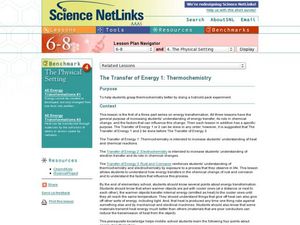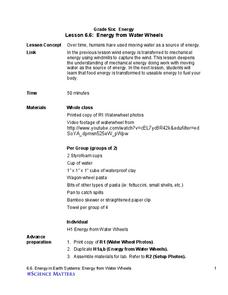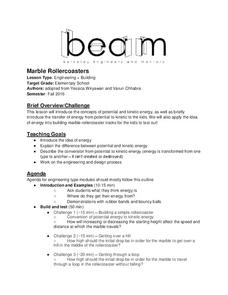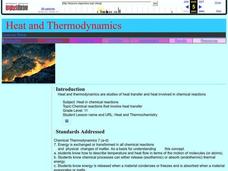Curated OER
The Transfer of Energy 1: Thermochemistry
Budding chemists achieve a basic understanding of the role of heat in chemical reactions. An online worksheet gives learners instructions and questions to answer as they investigate the Chem4Kids website and perform a hands-on lab...
Science Matters
Energy Transfer and Transformation
When you take a simple task and create an exceptionally difficult way to complete it, it is known as a Rube Goldberg machine. These machines are filled with many types of energy transfers and energy transformations. Here, pupils watch...
Curated OER
The Transfer of Energy 2: Electrochemistry
Students study about electrochemistry by increasing their understanding of electron transfer and its role in chemical changes. They explain that energy appears in different forms. Heat energy is in the disorderly motion of molecules.
Curated OER
Solar Electricity ~ The Colour Sensitivity of a Photovoltaic Cell
Teacher's notes, a materials list, detailed procedure, tips, and extension ideas are all included to make teaching this lesson on photovoltaic cells a sunny spot in your day! After some brief background reading, physical science...
Curated OER
Urban Heat Islands: An Introduction to Energy Transfer and Transformation
Elementary school physical scientists explore kinetic mechanical energy by dropping a golf ball on different surfaces. They discuss how human made materials might react to light differently from nature made materials. This lesson plan...
Science Matters
Energy from Water Wheels
Historians believe the first vertical water wheel was invented in Rome during the Augustan Age. The sixth lesson in the series of 10 has scholars experiment with designing their own water wheels. Through testing various pastas and...
Curated OER
The Chemistry of Refining Crude Oil
Consider our energy sources: wood, coal, oil, uranium. Learners compare the pollution to energy produced for each. They practice fractional distillation of an alcohol/water mixture to simulate the process of refining crude oil....
Science Matters
Peanut Energy
How do humans get energy since they aren't mechanical and can't photosynthesize? Learners explore this question by relating potential energy in food to human energy levels. Scholars measure the change in mass and a change in temperature...
Science Matters
Potential and Kinetic Energy
Everything has potential energy; learning to use it is the key to understanding all types of energy. Scholars learn the difference between kinetic and potential energy. They then apply the concept to drawing examples of both types of...
Curated OER
Simplified Vertical Rebound Testing
Students participate in a lab activity in which they examine a simple energy transformation system. Students test the rebound of elastomers, produce rebound data, and determine the kinetic energy transformed by the impact of a free...
Curated OER
Making a Battery and Energy Transformation
Seventh graders determine what makes a battery work. In this battery lesson, 7th graders brainstorm ideas about how they think batteries provide energy. They perform an experiment in which they work as a team to assemble a battery. They...
Curated OER
The Energy Debate - Energy of Peanut
Students articulate the difference between the terms heat and temperature. They calculate the amount of energy associated with a given temperature rise and design an experiment to measure the energy of a fuel.
Curated OER
Applied Science - Technology (3A) Post Lab
Third graders discuss how energy is created. In this energy lesson, 3rd graders look at how a city receives energy and how it is made. They create their own generator using a pin wheel and pipe cleaners.
Curated OER
Shrinky Dinks® Palettes
Here is a fun and clever lesson plan for teaching physics classes how to calculate wavelength if given the energy and frequency data. On a worksheet, they compute wavelengths using a table of information that you provide. On a paper...
National Renewable Energy Laboratory
Biomass: Biogas Generator
It's a gas. Middle schoolers build a biogas generator following the directions in this resource. After a few days of observation, they demonstrate that the gas given off by the decomposing manure is flammable. The activity concludes as...
Curated OER
Transformers
Students examine how a transformer works and its practical applications. In this electricity lesson students complete several experiments using transformers and generators.
Curated OER
Power: Work and Energy
Students explore how work and energy create power. They complete activities involving simple machines, energy, energy conversion, and the role of conductors and insulators. They choose from a menu of options the activities they would...
Chicago Botanic Garden
Understanding the Greenhouse Effect
The greenhouse effect is important, for without it, life on Earth would not exist. An activity that includes modeling the greenhouse effect and acting out the Earth's energy balance makes up the first part in a series of seven lessons....
University of California
Marble Rollercoasters
Don't let your classes coast through school! Engage them in their learning as they build their own roller coasters to study potential and kinetic energy. Young scholars complete several challenges that require them to consider the...
Curated OER
Thermal Energy and Heat Unit
Students explain that heat energy in a material consists of the disordered motions of its atoms or molecules. They know and explain that transformations of energy usually transform some energy into the form of heat, which dissipates by...
Curated OER
Kinetic and Potential Energy
Students calculate kinetic and potential energy in the lab. In this physics lesson, students demonstrate how energy can be transformed from one form to another. They collect data from the experiment and write a detailed lab report.
Curated OER
Heat and Thermodynamics
This is actually a 10-day mini unit on thermal energy for your high school chemists. Every avenue is taken to get learners absorbed in heat: a pretest, a PowerPoint presentation, Internet exploration, demonstrations, lab activities, and...
Purdue University
Can You Design a Hot or Cold Pack?
You're getting warmer. Groups conduct an experiment to determine which of four chemicals are in hot/cold packs. They learn about exothermic and endothermic reactions and use this knowledge to design a hot/cold pack that is small enough...
Curated OER
2D Motion
Students examine the motion of objects in two dimensions. In this dimensional lesson students view several demonstrations, complete a worksheet and a lab activity.

























